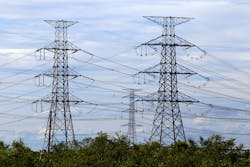LineVision Launches Asset Health Model for Utility Transmission Lines
LineVision, Inc., which enables utilities to improve transmission line capacity, resiliency and safety through advanced sensors and analytics, launched LineHealth, a new asset health evaluation tool for asset managers. LineHealth pairs LineVision’s non-contact transmission line sensors with physics-based digital twin technology to enable condition-based asset management.
The model tracks how factors such as high-temperature cycling, wind-driven oscillations/galloping and excessive physical loading events such as icing contribute to aging and loss of tensile strength of the conductor, and for the first time, provides a comparison of the built and actual sag history of the conductor. With this data, utility asset health managers are informed when their lines:
- are nearing the end of life and should be prioritized for repair or replacement before unplanned failures occur
- are healthy and end-of-life can be safely extended
- experience events which contributed to the loss of strength and safety/reliability risk
- experience anomalous motion consistent with damage
A Brattle Group study finds that most of the existing grid was built more than 30 to 50 years ago and estimates $25 to $40 billion in transmission investments are needed in the United States through 2025 to maintain the grid and meet existing renewable portfolio standard requirements. Utilities, which have historically relied on periodic visual inspections or disruptive and costly destructive testing to assess the condition of their lines, will need more comprehensive and scalable solutions going forward. LineHealth is said to be the first continuous and non-invasive solution to monitor the health of aging transmission infrastructure leveraging LineVision’s patented non-contact sensor technology.
“Condition-based asset monitoring and management are becoming a critical tool for utilities interested in improving the reliability and safety of their lines,” says Michael Hartnack, research analyst with Navigant Research. “Especially in the wake of the recent California wildfires, asset owners are increasingly focused on monitoring the health of their grid and receiving data needed to better prioritize scarce maintenance and renewal budgets.”
Navigant Research estimates the global revenue for transmission and distribution sensing and measurement technology to reach $4.8 billion by 2026 and the market to grow at an estimated compound annual growth rate (CAGR) of 10.7 percent between 2017 and 2026. Navigant also projects stand-alone transmission line monitors to grow at the fastest pace at a global CAGR of 19.9 percent.
“With aging transmission assets representing trillions of dollars on utility balance sheets globally, it is more important than ever for utilities to harness the power of advanced sensors and analytics to monitor the condition and remaining useful life of their transmission infrastructure,” says Hudson Gilmer, co-founder and CEO of LineVision. “We are seeing overwhelming interest from utility executives in how our technology not only detects anomalies which may indicate risk to assets or public safety, but also gives asset health managers data to inform condition-based maintenance and renewal investment decisions.”
LineVision offers the asset health model as a stand-alone solution for utilities or as an add-on to LineVision’s existing LineRate solution for unlocking additional capacity on existing lines with dynamic line ratings.
